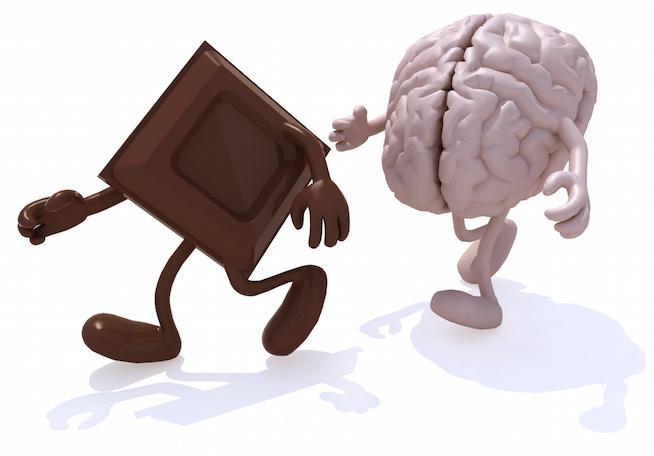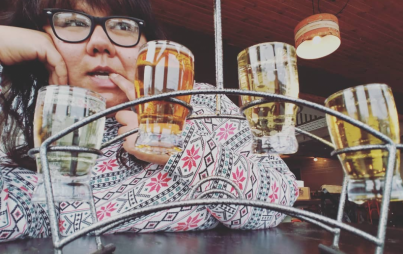
We're rooting for chocolate.
But if you try to quit an addiction and don’t address the underlying pain or discomfort that is causing it in the first place, you will just swap one addiction for another.
Do you feel like you have an addiction to food?
Do you think about it all the time? Fixate on it? Crave it constantly? Feel like you have no control once you start? Do you just eat and eat and eat until you are stuffed and miserable? Do you try to put away the chips or cookies, only to find you’re staring blankly at the wall, stuffing them into your face? Then wake up from your food frenzy brown-out and think, “That’s it! I’m so addicted to food, I have to do something about this!”?
I understand this well. I’ve been on both sides of the food addiction equation. I was a childhood binger who felt denied the good stuff (fruit gushers and cheetos) who became a teenage and adult dieter and binger, stuck in a miserable cycle, constantly complaining about my food addiction. I thought being a food addict was just my lot in life.
We hear people talking about their food addictions all the time.
“Oh I am addicted to food.”
“I need to diet because I am a food addict! I’d never stop!”
“I am totally addicted to cereal, can’t have it in the house!”
So...are we? Are we actually addicted to food?
The answer is complicated, and before we dive into it we have to talk about the fact that truly anything can become addictive. Any activity, substance, or even thought pattern can become compulsive and a way to soothe or numb us. That’s what addictions are: coping mechanisms that have less to do with the action and more to do with what we are avoiding, and they are very, very human. We don’t need to have any shame for having them, though our lives do tend to get better and fuller once we get to the bottom of the underlying causes or feelings.
Phones, shopping, praise, exercise, working, social media, alcohol, drugs, washing your hands, sex, selfies, TV, nail biting, and yes, food, all can be addictive. All can be ways to compulsively soothe, escape, or numb. And all are not inherently “bad” in and of themselves (with the exception of some drugs), and are perfectly fine if experienced in a joyful, balanced way.
But if you try to quit an addiction and don’t address the underlying pain or discomfort that is causing it in the first place, you will just swap one addiction for another.
In fact, new research on addiction is showing that the actual substances aren’t the things addicting us, but it is all way more to do with our inner lives and feelings of connection. Addictions fall away so much easier when the person underneath is being nourished emotionally.
However, this article is not leading where you think it might be leading in regards to food. I am not going to tell you to just start journaling or dealing with your feelings or getting a massage instead of eating your ice cream.
Food is complicated and unique because we cannot cut it out. We have to eat every day, many times a day, for the rest of our lives. And a good amount, too, or we aren’t nourishing ourselves and will jog the starvation response.
The crazy part is we need to be “addicted” to food. We need it to stay alive. We are biologically wired to be “addicted” to and fixate on food, especially when it feels scarce.
Which brings us to the answer:
Most food addiction is caused and perpetuated by restriction.
Yeah, really.
Most of our fixating and craving and overeating and bingeing is biological response to restriction. In fact, a study done in the 1940s took physically and mentally healthy men, cut their calories in half (to 1570 calories! That’s a common “diet” amount!) and they became completely obsessed with, and addicted to, food.
When we restrict calories, even just a little bit, our body goes into a lower metabolic state. It’s totally biological, and keeps us alive as a species. Part of this slower “starvation” mode also has our brains fixate on finding and eating food. Again, totally biological. Food becomes more pleasurable, we become more unable stop at what used to feel like a normal amount, and we essentially become wired to eat loads of food until the imbalance is corrected, and ample food supply is fully restored. Only then can the body and brain can go back to normal.
Taking this one step further, just thinking or perceiving that there is some sort of restriction can make our bodies do the same thing: fixate on food and slow down. The mind has way more control over our physical response to food than we tend to think it does. Meaning, if you think “I really shouldn’t eat this” or “I’ll just be good tomorrow” it can actually trigger the same response, which ends up making us truly hungrier than we would have been otherwise.
Basically, restriction and diet mentality make us food addicts. And our weird cultural relationship with food has made most of us a little biologically “addicted” to food.
In fact, remember how I listed those “addictive” activities above? Well, another really common addiction these days is dieting.
Yeah, dieting is a common addiction. It is a way for us to compulsively fixate on our food and escape or numb other parts of our lives that feel out of control. And then as a direct biological response to the dieting and restriction, we experience more food fixation, bingeing, and what feels like food addiction. So we think we need to diet more, and cycle continues.
It’s a freakin’ doozy.
That means that even if some of your eating is also “emotional,” and dieting and restricting won’t cure your food addiction — it’ll just make it worse.
So, yes: Journal, get massages, and feel your feelings, but don't to cut out foods to get over food addiction. In fact, allowing food actually gets to the root of the problem much more effectively.
Why isn’t this more common knowledge? Don’t ask me. I am doing everything I can to make this common knowledge. So many of us are in a horrible cycle of dieting/repenting, experiencing food addiction that is stemming from our diet culture, and thinking the answer is just to diet more.
I did, too. So when my food and body misery hit an all-time high, I decided to finally stop dieting.
I stopped trying to control my weight. I read up on metabolism and Health At Every Size, and decided to see if my body and brain would normalize when left to their own devices. And it worked.
All of my life-long food addiction and fixation fell away after I really, truly let myself eat whatever and however much I wanted.
Yes, it is totally counterintuitive at first. And yes, it is incredibly anti-establishment. Diet industries will crumble once we all learn this, but it’s true: your food addiction is being caused by your restriction.
And it really is so much better on the other side.







